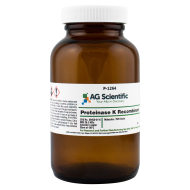In molecular biology Proteinase K (also protease K or endopeptidase K) is a broad-spectrum serine protease. The enzyme was discovered in 1974 in extracts of the fungus Engyodontium album (formerly Tritirachium album).
Proteinase K
Utilized in microbiology, Proteinase K (also known as protease K or endopeptidase K) is a broad-spectrum serine protease. The enzyme was discovered in 1974 in extracts of the fungus Engyodontium album (formerly Tritirachium album). Since the polypeptide chain of 279 amino acids and the three dimensional structure has a high degree of homology to bacterial subtilisins, proteinase K is classified as a member of the subtilisin family.
 Proteinase K has a specific activity of more than 30 U/mg and is thus one of the most active of the known endopeptidases and unspecifically hydrolyses native and denatured proteins.
Proteinase K is a non-specific serine protease used in the following applications: inactivation of RNase and DNases, isolation of high molecular weight DNA, isolation of RNA or the isolation of plasmid and genomic DNA.
Proteinase K has a specific activity of more than 30 U/mg and is thus one of the most active of the known endopeptidases and unspecifically hydrolyses native and denatured proteins.
Proteinase K is a non-specific serine protease used in the following applications: inactivation of RNase and DNases, isolation of high molecular weight DNA, isolation of RNA or the isolation of plasmid and genomic DNA.
Benefits of Choosing AG Scientific, Inc.
1. CUSTOM OR PRIVATE LABELING
- Custom cardboard packaging
- Custom product inserts
- Stringent tolerances and in-process volume checks to ensure accuracy
- Precision equipment for accurate fills (mg to multi-kilogram)
2. LARGE SCALE PURCHASES
We are buying and distributing more than anybody else, allowing us to offer fair and equitable pricing from the start. AG Scientific does provide quantity discounts. Bulk price discounts start at 5 times the largest catalog size. AG Scientific also provides discounts for standing orders or draw orders.3. HIGHLY TRUSTWORTHY ISO 9001 & ISO 13485 CERTIFIED
Our team is ready to be your supply and packing partner! Our San Diego laboratory specializes in co-packing with the most comprehensive packaging and labeling services available in the industry.4. SUPERIOR QUALITY
Chromatographically purified, DNase and RNase free. Our proteinase K can be used for the destruction of proteins in cell lysates (tissue, cell culture cells) and for the release of nucleic acids, since it very effectively inactivates DNases and RNases.5. HIGH ACTIVITY
High rate of activity towards denatured hemoglobin as substrate, proteinase K is 6 times as active as Pronase and about 3 times as active as bovine Trypsin. The enzyme's activity towards native proteins is stimulated by denaturants such as SDS. In contrast, when measured using peptide substrates, denaturants inhibit the enzyme. The reason for this result is that the denaturing agents unfold the protein substrates and make them more accessible to the protease.6. BROAD SUBSTRATE SPECIFICITY
Hydrolyses proteins, glycoproteins, peptides and esters of amino acids. The predominant site of cleavage is the peptide bond adjacent to the carboxyl group of aliphatic and aromatic amino acids with blocked alpha amino groups. It is commonly used for its broad specificity.7. VERSATILE
Utilized on a wide variety of sample materials such as blood, cultured cells, tissues, bacteria, yeast, etc.8. EXCELLENT STABILITY & COMPATABILITY
The enzyme is active and stable over a wide range of operating conditions. A proteinase K solution is stable over a broad pH range (4.0-12.5, optimum pH 8.0) and is also stable over the temperature range of 25-65°C during use. At pH 8.0, solutions will be stable for at least 12 months at 4°C. At pH 4-11.5, solutions containing Ca2+ (1-6 mM) are expected to be stable for several weeks.Additional Reading
- Frequently Asked Questions About Proteinase K
- Proteinase K - Bulk Packaging & Labeling Services
- 6 Reasons to Initiate Change Control with Manufacturers

